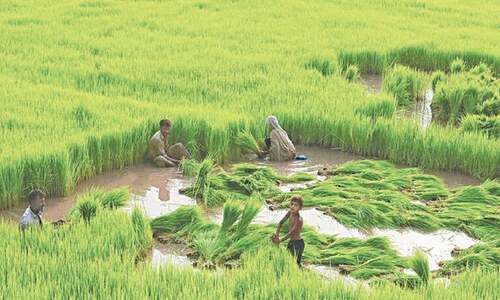 The current financial crisis in the West has critically exposed the vulnerabilities of a liberalised financial system. It has also highlighted the challenge that the policymakers and regulators are faced with in an increasingly globalised, ever-changing world.
The current financial crisis in the West has critically exposed the vulnerabilities of a liberalised financial system. It has also highlighted the challenge that the policymakers and regulators are faced with in an increasingly globalised, ever-changing world.
The domino effect of a trouble sparked by US sub-prime debt defaults underscores apparent and hidden linkages of the complex market capitalism that never ceases to spring surprises. Just when the financial gurus in the West thought that they have devised enough safeguards to avoid repeat of 1996 Far East Asian financial turmoil that shook many countries, they are faced with a new, in a way, more grave situation on their own soil.
How well will they be able to respond is yet to unfold. Whether or not the Fed rate cut and the stimulus package will soften the impeding US recession only time would tell. But some consensus is emerging that the US sub-prime debt crises may linger on for two to three years.
The banking, other financial institutions, fund and asset management giant firms in the West, meanwhile, will come under pressure from depositors and shareholders on how prudent have been their investment and lending policies.
Far away from the US and Europe, Pakistan watched at the tumbling of capital markets, keeping its fingers crossed. The local banking hierarchy and fund managers were concerned. But the primary reason for their anxiety was different. They were worried about issues surrounding upcoming elections and worsening law and order situation. They were also concerned about the infrastructure deficit, particularly energy shortages. All these factors create a congenial environment for foreign capital infows.
When contacted for their comments on the possible impact of troubled Western financial markets on the Pakistan’s capital market including high performing banking industry, high-placed sources in banking expressed the same views but differently: The global financial crisis has not affected Pakistan in the first round.
When approached through her media manager Dr Shamshad Akhtar declined to give comments on possible impact of the crisis on Pakistan. She also preferred to keep mum over what steps she intends to take to further consolidate the regulatory framework governing banks to rule out possibility of debt defaults and possible scams.
However, the SBP’s First Quarterly Report issued last month says that “the domestic economy is now more open and prone to external shocks than ever before”.
The SBP governor has,however, reinforced the direction of monetary policy that she thinks is best suited to the economy at this juncture. The biggest challenge to the economic fundamentals is posed by increasing pace of inflation. The State Bank moved against the global tide of falling interest rates and further tightened its monetary policy by increasing the discount rate and cash reserve ratios for banks.
During the press conference, Dr Shamshad reported to have said that so far Pakistan escaped the recent economic turmoil emerging from US and engulfing the developed European economies. Much would depend on the nature and duration of the global crisis.
“We have been able to escape the affect not because of some superior more efficient safeguards that we had but because we are too weak to figure in global financial matrix”, said a senior economist with rich international banking experience.
“No it has not affected us so far. We cannot possibly be totally immune but I do not see a big impact in the near future”, said Dr Khalid Mirza, head of Competition Commission.
He commended the State Bank for improving its supervisory function to regulate particularly the banking industry.
Zubyr Soomro, a senior Citi Bank executive spoke in his capacity as President, Overseas Chamber of Commerce and Industry, grouping of 168 influential multinationals and foreign companies including 32 members from the financial sector.
Mr Soomro sent his reaction via e-mail. He wrote, “The primary impact for us to consider would be tightened terms for access to international debt markets; these are there for emerging markets in particular. Some countries will also need to assess how much their local banks may have invested in some of the problematic instruments that have surfaced”.
“In our case though this is probably minimal and our banks have benefited from pretty effective financial sector reforms too, thus improving resilience to international shocks”, he added.
“We cannot afford to be complacent, institutions need to be strengthened “, said another senior retired banker.
The banking in Pakistan too is stressed because the other leg of the financial system, the securities market is not developed. “For the financial system to cope with demands of an emerging economy with so much potential, it needs the other pillar to be strengthened to provide a sound foundation for an expanding economy”.
“No decent person can wish others to suffer but the crisis in the West has created a situation pregnant with immense possibilities for Pakistan”, a senior banker told Dawn.
Explaining his position, the banker said that he expected a lot of investment funds looking eastward in the near future as options and yields in developed markets dried out.
“We need to prepare ourselves on war footing by getting floating barrages from the Middle East to overcome the energy shortages and to receive a fat chunk from the investment that would be diverted to surging economies of Asia”, Amir Siddiqui, head of the retail banking of National Bank of Pakistan told Dawn over telephone.













































Dear visitor, the comments section is undergoing an overhaul and will return soon.